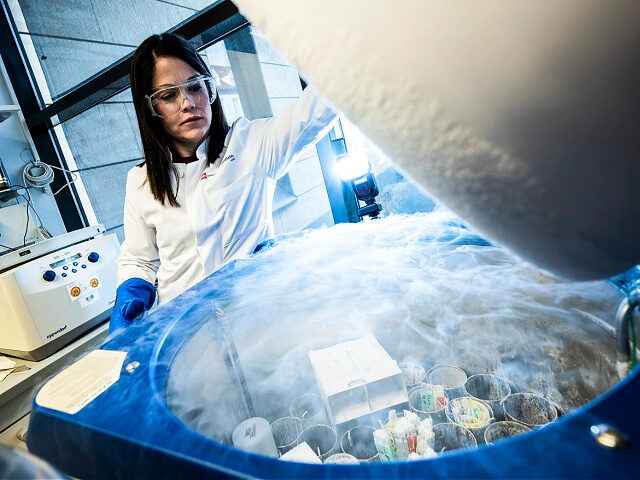The Alabama Supreme Court ruled on Friday that frozen embryos are considered unborn children under state law, and that anyone who destroys them may be held liable.
The case is centered on whether the Center for Reproductive Medicine can be held liable under the Wrongful Death of a Minor Act after a patient accessed, dropped, and destroyed the frozen embryos of several couples in 2020. The embryos were created for a process called in vitro fertilization (IVF), in which “mature eggs are collected from ovaries and fertilized by sperm in a lab, [and] then a procedure is done to place one or more of the fertilized eggs, called embryos, in a uterus, which is where babies develop,” according to the Mayo Clinic.
The state’s high court ultimately reversed a lower court ruling that did not recognize frozen embryos as unborn children. The Alabama Supreme Court’s based its reasoning on the Sanctity of Unborn Life Amendment adopted to the state Constitution in 2018, which declared it “public policy” to recognize “the sanctity of unborn life and the rights of unborn children.”
“This Court has long held that unborn children are ‘children’ for purposes of Alabama’s Wrongful Death of a Minor Act, a statute that allows parents of a deceased child to recover punitive damages for their child’s death,” the opinion reads.
“The central question presented in these consolidated appeals, which involve the death of embryos kept in a cryogenic nursery, is whether the Act contains an unwritten exception to that rule for extrauterine children — that is, unborn children who are located outside of a biological uterus at the time they are killed,” the justices continued. “Under existing black-letter law, the answer to that question is no: the Wrongful Death of a Minor Act applies to all unborn children, regardless of their location.”
The justices noted the the text of the Wrongful Death of a Minor Act is “sweeping and unqualified.”
“It applies to all children, born and unborn, without limitation,” they wrote. “It is not the role of this Court to craft a new limitation based on our own view of what is or is not wise public policy. That is especially true where, as here, the People of this State have adopted a Constitutional amendment directly aimed at stopping courts from excluding ‘unborn life’ from legal protection.”
In a concurring opinion, Justice Tom Parker quoted the Bible as he examined the “sanctity of unborn life.”
“Human life cannot be wrongfully destroyed without incurring the wrath of a holy God, who views the destruction of His image as an affront to Himself,” Parker wrote. “Even before birth, all human beings bear the image of God, and their lives cannot be destroyed without effacing his glory.”
Justice Gregory Cook dissented, warning that the decision “almost certainly ends the creation of frozen embryos through in vitro fertilization (IVF) in Alabama.”
Parker disagreed with Cook’s assessment, writing that the Alabama Legislature may choose to create laws in the area of IVF, which for decades “has been largely unregulated in the United States, with some commentators even comparing it to the Wild West.”
“For instance, in Australia and New Zealand, prevailing ethical standards dictate that physicians usually make only one embryo at a time,” he wrote.
He added:
On the related issue of embryo transfers, which is the process of implanting the embryos into the uterus, in Australia and New Zealand over 90% of embryo transfers occur only one at a time. Likewise, European Union (“EU”) countries set a legal limit on the number of embryos transferred in a single cycle. In EU countries, 58% of embryo transfers involve just one embryo, and 38% involve two; thus, 96% of embryo transfers in EU countries involve two or fewer transfers at one time.
Such limitations on embryo creation and transfer necessarily reduce or eliminate the need for storing embryos for extended lengths of time. Italy went one step further, banning cryopreservation of embryos except when a bona fide health risk or force majeure prevented the embryos from being transferred immediately after their creation.21 All of these measures protect the lives of the unborn and still allow couples to become parents.
“Therefore, although certain changes to the IVF industry’s current creation and handling of embryos in Alabama will result from this decision, to the extent that Justice Cook is predicting that IVF will now end in Alabama, that prediction does not seem to be well-founded,” he concluded.
The ruling is the first of its kind, the Washington Post reported.
“[A]t least 11 states have broadly defined personhood as beginning at fertilization in their state laws, according to reproductive rights group Pregnancy Justice…,” the report states.
The case is LePage v. The Center for Reproductive Medicine, No. SC-2022-515 and No. SC-2022-579 in the Supreme Court of Alabama.
Katherine Hamilton is a political reporter for Breitbart News. You can follow her on X @thekat_hamilton.


COMMENTS
Please let us know if you're having issues with commenting.